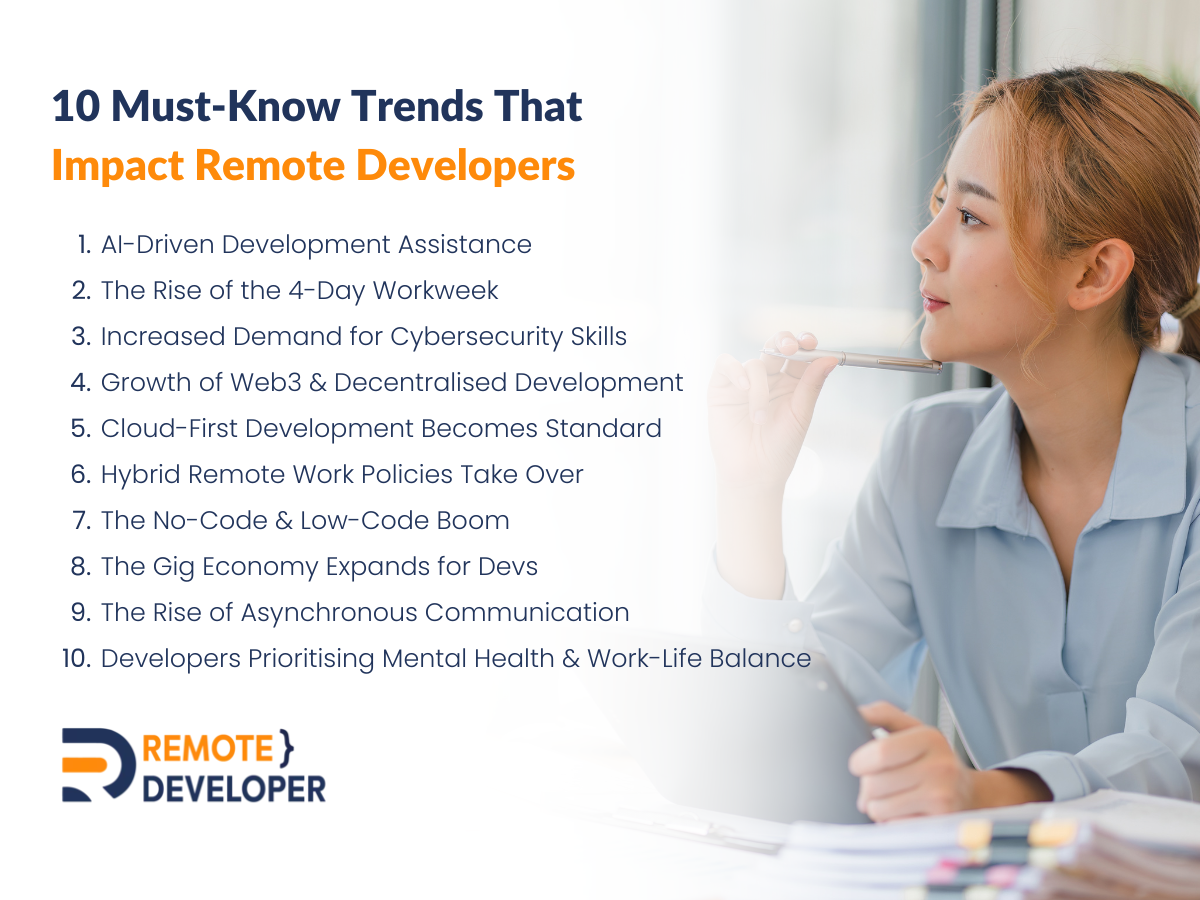Remote development is undergoing a major transformation, driven by advancements in AI, cybersecurity, cloud computing, and flexible work models. As companies adapt to new industry demands, developers must stay ahead of emerging trends to remain competitive and productive.
In 2025, remote work will be more dynamic than ever, with shifts in work culture, technology, and developer expectations shaping the future of the industry. From AI-driven coding assistance to the rise of asynchronous collaboration, these trends will redefine how developers work, collaborate, and innovate.
10 Must-Know Trends That Impact Remote Developers
Remote developers must navigate rapid industry changes to stay ahead. Emerging trends in AI, cybersecurity, cloud computing, and flexible work models are reshaping how developers work, collaborate, and innovate. Adapting to these shifts will be crucial for staying competitive in the evolving digital landscape.

AI-Driven Development Assistance
AI-powered coding tools are transforming the development process by automating repetitive tasks, debugging code, and suggesting improvements. These tools help developers work faster and more efficiently, allowing them to focus on solving complex problems instead of writing boilerplate code.
Why It Matters:
- AI can reduce development time and increase efficiency.
- Provides real-time suggestions to improve code quality.
- Frees up developers from mundane tasks, allowing focus on innovation.
- Reduces errors through automated debugging and testing.
- Improves collaboration with AI-generated documentation.
How to Adapt:
- Learn to integrate AI coding assistants like GitHub Copilot or Tabnine.
- Use AI to automate repetitive tasks and improve speed.
- Leverage AI tools for code review and debugging.
- Stay updated on the latest AI technologies in development.
- Incorporate AI-powered documentation tools into your workflow.
The Rise of the 4-Day Workweek
More companies are shifting to a 4-day workweek, prioritising productivity and employee well-being. Remote developers, in particular, benefit from this shift, as shorter workweeks improve efficiency, enhance work-life balance, and reduce burnout while maintaining flexibility.
Why It Matters:
- Shorter workweeks lead to higher productivity and job satisfaction.
- Offers developers more personal time without sacrificing income.
- Promotes a better work-life balance, reducing burnout.
- Increases employee engagement and retention.
- More companies are adopting this model, creating job market trends.
How to Adapt:
- Focus on effective time management to meet deadlines in fewer hours.
- Streamline workflows by using automation tools.
- Prioritise high-impact tasks for optimal productivity.
- Communicate proactively with team members to ensure project success.
- Set clear boundaries between work and personal life.
Increased Demand for Cybersecurity Skills
With the rise of remote work, cybersecurity threats are increasing, making security skills a necessity for developers. Companies are investing heavily in secure coding practices to protect sensitive data from breaches and attacks.
Why It Matters:
- Cybersecurity is a growing concern in the remote work era.
- Secure coding is critical for protecting user data and privacy.
- Security breaches can lead to severe reputational and financial losses.
- More companies are looking for developers with cybersecurity expertise.
- Compliance regulations require stricter security measures.
How to Adapt:
- Learn secure coding practices and encryption methods.
- Familiarise yourself with security tools like firewalls and VPNs.
- Stay updated on cybersecurity best practices and threats.
- Implement security measures like two-factor authentication (2FA).
- Participate in security-related online courses and certifications.
Growth of Web3 & Decentralised Development
Blockchain-based applications are changing how digital services are built, with decentralised apps (dApps) gaining popularity. Developers are shifting towards Web3 technologies to create more transparent and secure applications.
Why It Matters:
- Web3 offers decentralisation, enhancing transparency and security.
- Smart contracts reduce the need for intermediaries in transactions.
- Web3 applications are becoming more mainstream in various industries.
- Developers skilled in Web3 technologies are in high demand.
- Blockchain provides a new frontier for innovative application development.
How to Adapt:
- Learn blockchain and smart contract programming languages.
- Experiment with Web3 frameworks like Ethereum or Solana.
- Stay informed about emerging trends in decentralised applications.
- Explore the integration of cryptocurrencies and NFTs in applications.
- Join Web3 communities to collaborate and learn from experts.
Cloud-First Development Becomes Standard
Cloud-based infrastructure is now the default for software development, providing developers with scalable and cost-effective solutions. Remote developers benefit from cloud-native applications, as companies prioritise flexibility and reliability in their development strategies.
Why It Matters:
- Cloud platforms offer unmatched scalability and flexibility.
- Cloud-based solutions are more cost-effective for businesses.
- Remote teams can easily collaborate using cloud tools.
- Cloud-native development allows faster deployment and updates.
- More companies are adopting cloud-first strategies for long-term growth.
How to Adapt:
- Gain proficiency in major cloud platforms like AWS, Azure, or GCP.
- Use cloud-native tools like Kubernetes for container management.
- Learn about serverless architectures to reduce operational complexity.
- Implement CI/CD pipelines to streamline cloud-based deployments.
- Optimise cloud costs by understanding pricing models and scalability.
Hybrid Remote Work Policies Take Over
Companies are adopting hybrid work models that combine remote flexibility with in-office collaboration. This approach balances productivity, team bonding, and workplace culture, ensuring developers can work efficiently while maintaining personal connections with their teams.
Why It Matters:
- Hybrid work models cater to diverse working preferences.
- Developers can maintain work-life balance while staying engaged with their teams.
- Hybrid policies enhance flexibility in work schedules.
- Allows for better team collaboration across locations.
- Promotes in-person interactions for better team dynamics.
How to Adapt:
- Invest in reliable collaboration tools like Zoom or Slack.
- Develop self-discipline to stay productive when working remotely.
- Create a structured hybrid work schedule that fits your team’s needs.
- Regularly check in with team members to maintain communication.
- Adapt to both in-office and remote settings seamlessly.
The No-Code & Low-Code Boom
No-code and low-code platforms are transforming software development by enabling rapid application building with minimal coding effort. These tools help developers automate workflows, accelerate prototyping, and integrate solutions faster, making software development more accessible and efficient.
Why It Matters:
- No-code and low-code platforms accelerate application development.
- Enable non-technical users to build apps, reducing bottlenecks.
- Streamline workflows, allowing developers to focus on high-priority tasks.
- Lower the barrier to entry for creating functional apps.
- Support rapid prototyping and faster deployment.
How to Adapt:
- Explore popular platforms like Bubble, OutSystems, and Mendix.
- Learn how to integrate no-code tools with traditional development workflows.
- Automate workflows using low-code platforms for efficiency.
- Use these platforms for rapid prototyping and testing new ideas.
- Stay updated on the latest features and capabilities of no-code tools.
The Gig Economy Expands for Devs
Freelancing and contract-based work are becoming more mainstream for remote developers. Companies are shifting towards flexible hiring models, allowing them to take on multiple projects, increase income streams, and gain more control over their schedules.
Why It Matters:
- The gig economy offers greater income potential for developers.
- Freelancing allows more flexibility and work-life balance.
- Companies are increasingly hiring remote contractors for specific projects.
- Developers can gain diverse experience by working on different projects.
- Increased competition in the freelance job market requires a strong personal brand.
How to Adapt:
- Build a strong portfolio showcasing your work and skills.
- Network with clients and other developers to expand your opportunities.
- Use platforms like Upwork and Fiverr to find freelance work.
- Diversify your income streams by taking on multiple projects.
- Set clear boundaries for work hours and project deadlines.
The Rise of Asynchronous Communication
With remote teams spread across different time zones, asynchronous communication is becoming the standard. By reducing reliance on real-time meetings, async work fosters deep focus, encourages written documentation, and improves overall team productivity.
Why It Matters:
- Reduces the need for real-time meetings, allowing flexibility.
- Improves focus by minimizing distractions from constant communication.
- Facilitates collaboration across different time zones.
- Encourages detailed documentation that can be referenced later.
- Enhances productivity by allowing people to work at their own pace.
How to Adapt:
- Use asynchronous tools like Slack, Notion, or Loom for communication.
- Write clear, concise messages to avoid misunderstandings.
- Set expectations for response times and communication standards.
- Prioritise documentation to ensure information is accessible at all times.
- Embrace async-first workflows and reduce the need for real-time meetings.
Developers Prioritising Mental Health & Work-Life Balance
As remote work continues to blur boundaries between personal and professional life, developers are focusing on mental well-being. Companies are implementing wellness programs and flexible work policies to prevent burnout and improve job satisfaction.
Why It Matters:
- Mental health is a critical factor in long-term career sustainability.
- Prioritising well-being helps prevent burnout and enhances productivity.
- Companies are more likely to retain employees who are supported mentally and emotionally.
- Developers with better work-life balance report higher job satisfaction.
- A focus on well-being improves overall team dynamics and collaboration.
How to Adapt:
- Establish clear boundaries between work and personal time.
- Take regular breaks to reduce mental fatigue and increase focus.
- Participate in wellness programs offered by your company.
- Advocate for flexible work hours and mental health days.
- Practice mindfulness and stress management techniques to maintain mental health.
Conclusion
Remote development is evolving rapidly, and staying ahead of these trends is key to thriving in 2025. Embracing AI, cybersecurity, cloud-native development, and flexible work models will keep developers competitive. Prioritising adaptability and work-life balance ensures long-term success.
Which trend excites you the most? Contact us and let’s discuss!

